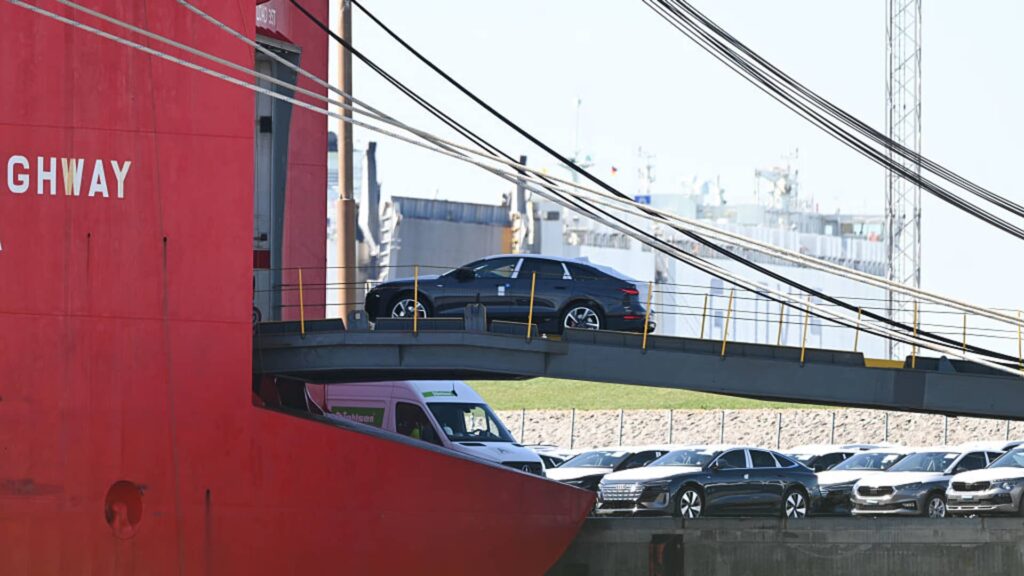An employee mounts a VW logo on a new Volkswagen Tiguan at the VW main plant.
Picture Alliance | Picture Alliance | Getty Images
Auto giants have responded to U.S. President Donald Trump‘s tariffs by announcing plans to raise prices, impose import fees, pause production and even layoff staff.
As part of plans designed to shift production to U.S. factories and bolster American jobs, the Trump administration on Thursday introduced 25% tariffs on foreign auto imports. The White House also said it intends to place tariffs on some auto parts no later than May 3.
The measures, which were separate to Trump’s sweeping new tariffs on major trading partners, have hit the global automotive industry hard.
Shares of some of the world’s biggest car brands traded sharply lower on Friday, extending steep losses from the previous session. Auto stocks fell deeper into negative territory shortly after China’s finance ministry said Beijing intends to impose a 34% tariff on all goods imported from the U.S. starting on April 10.
Stellantis, which owns household names including Jeep, Dodge, Fiat, Chrysler and Peugeot, traded 8% lower at 12:55 p.m. (7:55 a.m. ET) London time. The Milan-listed stock fell over 8% in the previous session.
Germany’s Volkswagen, BMW and Mercedes-Benz Group, meanwhile, all traded around 4% lower on Friday.
How have carmakers responded?
Volkswagen, Europe’s biggest carmaker, is planning to add import fees to the sticker prices of its vehicles shipped to the U.S. in response to Trump’s tariffs. The German auto giant has also reportedly halted all rail shipments of vehicles built in Mexico to the U.S.
The measures, which were first reported by trade publication Automotive News, appear to underscore the immediate impact of Trump’s tariffs on the company.
“We communicate to our dealer body about all aspects of the business, and we want to be very transparent about navigating through this time of uncertainty,” a spokesperson for Volkswagen told CNBC via email on Thursday.
“We have our dealers’ and customers’ best interests at heart, and once we have quantified the impact on the business we will share our strategy with our dealers,” they added.
The Stellantis Windsor Assembly Plant is shown on April 1, 2025 in Windsor, Canada.
Bill Pugliano | Getty Images News | Getty Images
Stellantis, meanwhile, announced on Thursday it will pause production at two assembly plants in Canada and Mexico. The move means about 900 workers in the U.S. at supporting plants will be temporarily laid off.
The actions were seen as representing the most drastic by an automaker regarding the new tariffs.
Stellantis’ downtime starts Monday and is set for two weeks at the automaker’s Windsor Assembly Plant in Ontario, Canada, and the entire month of April at its Toluca Assembly Plant in Mexico.
Boost to U.S. production
An escalating global trade war is expected to have a profound impact on the car industry, particularly given the high globalization of supply chains and the heavy reliance on manufacturing operations across North America and particularly Mexico.
Sweden’s Volvo Cars reportedly said Thursday it intends to produce more cars in the U.S. and ramp up its regionalization efforts with hubs in China and Europe.

“We are well prepared in China and in Europe. But we need to be better in the U.S. to get around the import tariffs,” Volvo Cars CEO Hakan Samuelsson said Thursday, according to Reuters.
A spokesperson for Volvo Cars said on Friday that the company is looking to ramp up production of its EX90 SUV to the U.S. to grow volumes and reduce costs.
“The global car industry, as well as Volvo Cars, is facing increased geopolitical complexity and regionalisation. This makes Volvo Cars’ long-held strategy of building where we sell even more important,” a spokesperson for Volvo Cars told CNBC via email.
“As part of this, Volvo Cars is also considering the potential possibility of adding production of another car model in our US plant, that has a capacity of 150,000 cars per year,” they added.
A spokesperson for Volvo Cars was not immediately available to comment when contacted by CNBC on Friday.
Elsewhere, Italy’s luxury carmaker Ferrari said last week that it will raise prices on certain models after April 1 in response to the new U.S. auto tariffs, adding up to $50,000 to the price of a typical car.
— CNBC’s Michael Wayland & Robert Frank contributed to this report.







